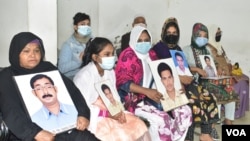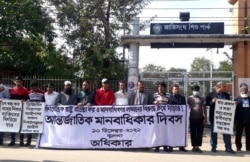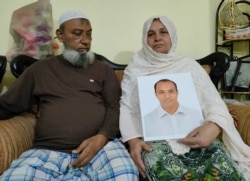Rights activists are alleging that police and a paramilitary force in Bangladesh are coercing families of the victims of enforced disappearances to issue statements that they deliberately misled police by hiding information about how their relatives went missing.
A 57-page report by Human Rights Watch in August last year said that “despite credible and consistent evidence that Bangladesh security forces routinely commit enforced disappearances, the ruling Awami League has ignored calls by donor governments, the U.N., human rights organizations, and civil society to address the culture of impunity.”
Rights activists have said the security agencies themselves are writing the statements and asking the families to sign them to make them look like voluntary statements from the families.
“According to the statements, the disappeared persons had gone into hiding on their own, and the families falsely reported them as cases of enforced disappearance,” Mohammad Ashrafuzzaman, liaison officer of the Asian Legal Resource Center in Hong Kong, told VOA on January 28.
“The police and RAB are coercing the victim families into signing the so-called statements in an attempt to exculpate the perpetrators,” he said, referring to Bangladesh’s paramilitary Rapid Action Battalion.
The recent police pressure on the families of the victims of enforced disappearance was triggered by the U.S. human rights-related sanctions on the RAB last month, Ashrafuzzaman added.
On December 10, the U.S. imposed human-rights-related sanctions on the RAB and six former and current officers, saying they were responsible for hundreds of enforced disappearances and extrajudicial killings.
Since 2010, human rights groups have published dozens of reports claiming police, military, RAB and other security agencies were involved in enforced disappearances of people who were mostly political activists and dissidents opposed to Prime Minister Sheikh Hasina’s Awami League-led government.
According to the Bangladeshi human rights organization Odhikar, between 2009 and September 2021, at least 605 people vanished by enforced disappearance in the country. Among those who disappeared, 81 were found dead and 154 people remain missing, the organization said.
Last month (DEC 2021), the United Nations Working Group on Enforced or Involuntary Disappearances said it knew of “86 documented cases [of enforced disappearance in Bangladesh] in which the victims’ fate and whereabouts remain unknown.”
One of the 86 cases of victims of enforced disappearance who remain missing is that of Mahabub Hasan Sujan, a student wing leader of the opposition Bangladesh Nationalist Party. Sujan, then 31, went missing after some men, introducing themselves as members of a law enforcement agency, picked him up in December 2013.
Sujan’s father, Abdul Jalil Khan, said he refused to sign the statement the police brought to him on January 10.
The police brought a statement written by themselves to my house and asked me to sign it. When I read it, I found it did not carry the true description of how exactly my son had disappeared,” Khan, 74, told VOA.
Sujan’s family all along has insisted he was picked up by “members from a law enforcement agency.” But the statement the police wanted Khan to sign said he had been “taken away by some unknown person or group,” the elder Khan said.
“I told the police I would not sign it. … We are anxious. We fear that the police might return, trying to pick me up again,” Khan added.
Farid Ahmed Raju, a BNP activist, remains missing after RAB allegedly picked him up in January 2014. His sister, Shilpi Akhtar, said in the second week of this month, her family was coerced into signing statements by police.
“My husband, mother and I were forced to sign three separate statements. We do not know what the statements said,” Akhtar told VOA.
“When I asked why we had to sign the statements, police said they were in our interest or would help us.”
Afroza Islam Ankhi, a co-founder of Mayer Daak, which represents families of the victims of enforced disappearance, said January 28 that police and RAB tried to coerce several families to sign the statements in the past three weeks.
“I don't think that it is necessary to get any signed statement from any family in the interest of an investigation. The police are seeking the signed statements in an attempt to cover up their crimes,” Ankhi told VOA. “People fear the police in our country. So, some families are ending up signing the statements."
Despite many attempts, VOA failed to get a response from Bangladesh police and RAB.
Since the current Awami League-led regime came to power in 2009, Bangladesh has become all too familiar with enforced disappearance, said exiled BNP leader A.K.M. Wahiduzzaman. The former university teacher in Bangladesh fled to Malaysia in 2016, fearing for his life.
“Statistical evidence shows that the number of cases of enforced disappearance and extrajudicial killing spiraled in the months leading up to the last two general elections. And more than half of the victims were political opposition activists and leaders. The government-compliant security agencies use enforced disappearance as a tool, largely to decimate the political opposition force in the country,” Wahiduzzaman told VOA.
“Now, the crimes committed by the security agencies of Bangladesh have been exposed to the world and the global pressure against the government has increased in recent weeks. This is the reason the agencies are desperately trying to hide their criminal records.”
Ashrafuzzaman said the latest round of organized coercion by the security agencies indicates “the masterminds within the government are afraid of the consequences of their command responsibilities and have been trying to wash the bloods from their hands.”
“The tactics of silencing the surviving families will not work finally. It is the time for the perpetrators to suffer the consequences of the crime against humanity that they have been committing for over a decade,” he said.








![Families and friends of the victims of enforced disappearance in Bangladesh demonstrating on the streets of Dhaka on December 10, 2021, hours after the US imposed human rights-related sanctions on Bangladesh's paramilitary force Rapid Action Battalion [RAB]. RAB is accused of a serious level of human rights violations, including the enforced disappearance of people. (Photo by Tazul Islam)](https://gdb.voanews.com/DDC89AE5-EC21-4EAF-B81D-75D659AF751C_w250_r0.jpg)